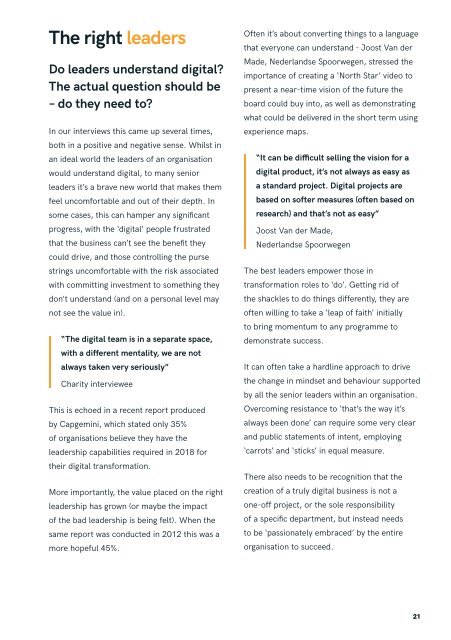GS_Transformation_report_6-Single-Pages
You also want an ePaper? Increase the reach of your titles
YUMPU automatically turns print PDFs into web optimized ePapers that Google loves.
The right leaders<br />
Do leaders understand digital?<br />
The actual question should be<br />
– do they need to?<br />
In our interviews this came up several times,<br />
both in a positive and negative sense. Whilst in<br />
an ideal world the leaders of an organisation<br />
would understand digital, to many senior<br />
leaders it’s a brave new world that makes them<br />
feel uncomfortable and out of their depth. In<br />
some cases, this can hamper any significant<br />
progress, with the ‘digital’ people frustrated<br />
that the business can’t see the benefit they<br />
could drive, and those controlling the purse<br />
strings uncomfortable with the risk associated<br />
with committing investment to something they<br />
don’t understand (and on a personal level may<br />
not see the value in).<br />
“The digital team is in a separate space,<br />
with a different mentality, we are not<br />
always taken very seriously”<br />
Charity interviewee<br />
This is echoed in a recent <strong>report</strong> produced<br />
by Capgemini, which stated only 35%<br />
of organisations believe they have the<br />
leadership capabilities required in 2018 for<br />
their digital transformation.<br />
More importantly, the value placed on the right<br />
leadership has grown (or maybe the impact<br />
of the bad leadership is being felt). When the<br />
same <strong>report</strong> was conducted in 2012 this was a<br />
more hopeful 45%.<br />
Often it’s about converting things to a language<br />
that everyone can understand - Joost Van der<br />
Made, Nederlandse Spoorwegen, stressed the<br />
importance of creating a ‘North Star’ video to<br />
present a near-time vision of the future the<br />
board could buy into, as well as demonstrating<br />
what could be delivered in the short term using<br />
experience maps.<br />
“It can be difficult selling the vision for a<br />
digital product, it’s not always as easy as<br />
a standard project. Digital projects are<br />
based on softer measures (often based on<br />
research) and that’s not as easy”<br />
Joost Van der Made,<br />
Nederlandse Spoorwegen<br />
The best leaders empower those in<br />
transformation roles to ‘do’. Getting rid of<br />
the shackles to do things differently, they are<br />
often willing to take a ‘leap of faith’ initially<br />
to bring momentum to any programme to<br />
demonstrate success.<br />
It can often take a hardline approach to drive<br />
the change in mindset and behaviour supported<br />
by all the senior leaders within an organisation.<br />
Overcoming resistance to ‘that’s the way it’s<br />
always been done’ can require some very clear<br />
and public statements of intent, employing<br />
‘carrots’ and ‘sticks’ in equal measure.<br />
There also needs to be recognition that the<br />
creation of a truly digital business is not a<br />
one-off project, or the sole responsibility<br />
of a specific department, but instead needs<br />
to be ‘passionately embraced’ by the entire<br />
organisation to succeed.<br />
21


